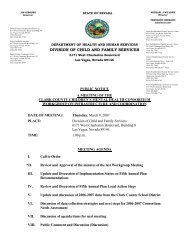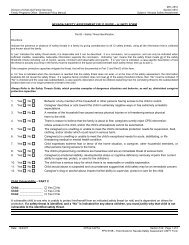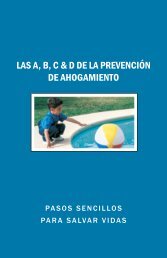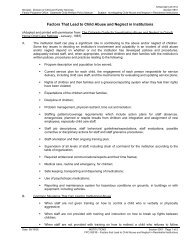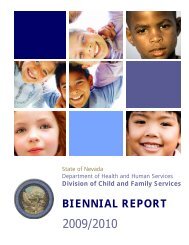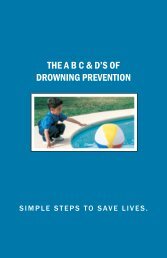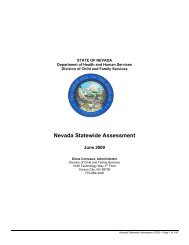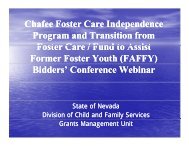STATE OF NEVADA - Division of Child and Family Services
STATE OF NEVADA - Division of Child and Family Services
STATE OF NEVADA - Division of Child and Family Services
You also want an ePaper? Increase the reach of your titles
YUMPU automatically turns print PDFs into web optimized ePapers that Google loves.
as well as foster parents, are trained on state <strong>and</strong> federal laws regarding special education rights <strong>and</strong> services. During the<br />
current grant period, approximately 100 additional surrogate volunteers were trained. LACSN has worked with the<br />
Southern Nevada Paralegal Association <strong>and</strong> the UNLV William S. Boyd School <strong>of</strong> Law to recruit new volunteers to<br />
become surrogates. Approximately 90 children had active educational surrogates acting on their behalf with the school<br />
district. Funding for an additional year was provided in the spring <strong>of</strong> 2010 to update the training manual <strong>and</strong> train more<br />
volunteers.<br />
The training goal has been met in a variety <strong>of</strong> ways. A Special Education Manual was created by staff at LACSN. The<br />
manual presents the pertinent federal <strong>and</strong> state law in an easily underst<strong>and</strong>able manner <strong>and</strong> contains useful Clark County<br />
School District information, including an overview <strong>of</strong> how the District is structured <strong>and</strong> the District's regulations regarding<br />
Special Education. The manual can be adopted for used by other jurisdictions.<br />
A fourth program supported by CIP is the Nevada CASA Association, Inc. CIP has provided second year funding for the<br />
Nevada CASA Association, Inc., which ended in August 2009. The purpose <strong>of</strong> the Nevada CASA Association is to support<br />
existing local CASA programs with volunteer recruitment, training, <strong>and</strong> support as needed; exp<strong>and</strong> the program to one<br />
additional court per year, to reach the goal <strong>of</strong> providing a CASA volunteer for every abused <strong>and</strong> neglected child; <strong>and</strong> to<br />
promote the CASA mission throughout Nevada. With more CASA programs <strong>and</strong> more volunteers, more abused <strong>and</strong><br />
neglected children have advocates working toward the ultimate goal <strong>of</strong> permanency. Since May 2009, there has been a<br />
10.2% decrease in the number <strong>of</strong> children served in the rural areas in particular, <strong>and</strong> the cause for this decline is under<br />
investigation. Additional efforts made to promote the CASA mission include:<br />
• August 6-9, 2009, Bill Fowler, Director <strong>of</strong> Nevada CASA Association, volunteered at the Legend’s Reno-Tahoe Open<br />
Golf Tournament. Bill was able to speak with 15-20 people about CASA.<br />
• September 19-20, 2009, NCA sponsored Bowling for CASA in Carson City, Las Vegas <strong>and</strong> Reno, with a combined<br />
turnout <strong>of</strong> more than 100 people. The main purpose is to promote CASA, but the fundraising component will be<br />
shared with the local CASA programs in Carson City <strong>and</strong> Las Vegas.<br />
The current economic recession has <strong>and</strong> will adversely impact the funding <strong>of</strong> current CASA programs, start-ups <strong>of</strong><br />
additional CASA programs for rural counties, <strong>and</strong> NCA goals.<br />
A fifth initiative sponsored by the CIP is the Early Representation Pilot Project. Begun in February 2009, this pilot project<br />
follows best practice research regarding improving outcomes for children by reducing to a minimum the time a child<br />
spends in placement, <strong>and</strong> expediting comprehensive case planning while applying active efforts to reach an early<br />
resolution <strong>of</strong> plan <strong>and</strong> permanency. A core <strong>of</strong> the program is immediate appointment <strong>of</strong> counsel for children <strong>and</strong> parents,<br />
exchange <strong>of</strong> reports <strong>and</strong> necessary information, <strong>and</strong> a facilitated series <strong>of</strong> meetings with all counsel <strong>and</strong> stakeholders,<br />
within days <strong>of</strong> removal to identify <strong>and</strong> resolve conflicts <strong>and</strong> reach a collaborative solution. All cases are assigned to a<br />
single judicial <strong>of</strong>ficer <strong>and</strong> originate from a single geographic service area. The project has met the first goal <strong>of</strong> having 25<br />
cases in ERP. Related to this goal, is the goal <strong>of</strong> assuring that all children <strong>and</strong> all parents in ERP actually receive legal<br />
counsel <strong>and</strong> assuring counsel’s participation in hearings, safety team meetings <strong>and</strong> any subsequent child <strong>and</strong> family team<br />
(CFT) <strong>and</strong> other case-related meetings. This goal was met. A data collection system has been developed with help from<br />
the Administrative Office <strong>of</strong> the Courts (AOC); a worksheet that captures the statistical information needed for analysis is<br />
complete <strong>and</strong> operational. The DCFS – Rural Region has trained its <strong>Child</strong>ren’s Clinical <strong>Services</strong>’ therapists to serve as<br />
safety team facilitators. ERP has two assigned clinical services workers who facilitate all safety team meetings <strong>and</strong> within<br />
a day, provide summaries to the stakeholders via e-mail. Monthly stakeholder meetings are held to address <strong>and</strong> resolve a<br />
wide range <strong>of</strong> issues related to the pilot project. Since the beginning <strong>of</strong> the project, 84 children have been provided legal<br />
representation. Of those, 42 have been reunified <strong>and</strong> their cases closed. Of the remaining 42 children, 13 have been<br />
placed back with their parent(s), 10 are in a relative placement <strong>and</strong> 19 remain in foster care. The second goal <strong>of</strong><br />
assigning cases to a control group started in February 2010. Second year funding was approved through CIP.<br />
A sixth <strong>and</strong> final initiative l was to improve video conferencing capabilities in the courts to improve communication <strong>and</strong><br />
training opportunities. Elko County, Humboldt County, <strong>and</strong> White Pine County District Courts were all approved to receive<br />
video conferencing equipment as part <strong>of</strong> the CIP effort to implement video conferencing capabilities in courts for use in<br />
child welfare cases. Elko County is completely operational <strong>and</strong> has started providing quarterly information on its use.<br />
White Pine County is expected to be operational within 30 days. Once the technical issues are resolved in Humboldt<br />
County, video conferencing should be available within 30-45 days.<br />
Nevada APSR – SFY 2010<br />
Page 73 <strong>of</strong> 108



